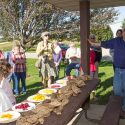Science is in your hands at annual Science Expeditions event
A little hands-on exploration can open a whole new world, and Science Expeditions — set for Saturday, April 2, this year — is a passport to the world of research at UW–Madison.
The key to the annual campuswide science open house is not so much a collection of interactive exhibits, but the cast of interactive scientists that go along with them, according to Tom Zinnen, a Science Expeditions organizer.
“It’s an opportunity to interact with scientists that guide and coach you as you participate and develop your own scientific savvy,” says Zinnen, an outreach specialist for the Biotechnology Center. “You get to experience science as an explorer within this community of researchers.”
Zinnen sees UW–Madison’s array of museums and exhibits and enthusiastic researchers — each with its own focus, exhibits and calendar of events — as constellation of science venues.
“This campus is 930 acres of destination,” he says. “Science Expeditions itself is a great experience, but the best part is that it helps people see what they can do on the other 364 days of the year.”
Nearly a dozen different venues on campus — connected to each other and free parking by a trolley that will run from 10 a.m. to 5 p.m. — will welcome inquisitive minds of all ages.
The Wisconsin Institutes for Discovery will serve as a hub, hosting more than 50 “Exploration Stations,” which aim to put the inner workings of bugs, people, plants, robots, chemistry labs and more in the hands of visitors.
A series of Science Spectaculars focus on particular scientific disciplines:
- Dinosauria, at 4 p.m. in Chamberlin Hall, brings a pair of Chicago-based, fossil-hunting paleontologists to Madison along with actual dinosaur bones visitors can explore with their own hands.
- The Wonders of Physics, at noon and 1:30 p.m. in Chamberlin Hall, draws assistant scientists from the audience to test the liquid nitrogen cannon and static electricity’s ability to levitate objects.
- A pair of programs by SPICE (Students Participating in Chemical Education) — the Chemistry Show, in which they demonstrate dramatic chemical transformations, spectacular catalysts and exciting energy exchanges, and Fusion Science Theater, plays based on single scientific questions — throughout the day in the Chemistry Building.
Satellites in the Science Expeditions constellation include the UW Arboretum, Botanical Gardens, Geology Museum, Science House, Atmospheric and Oceanic Sciences, Botany Greenhouse, DC Smith Greenhouse, Zoological Museum, Microbe Place, Babcock Hall Dairy Store, Ingersoll Physics Museum, Wisconsin National Primate Research Center, and the afternoon milking at the Dairy Cattle Research Center
For a full map, schedule and information on parking, bus routes and the circulating trolley, visit the Science Expeditions website.


